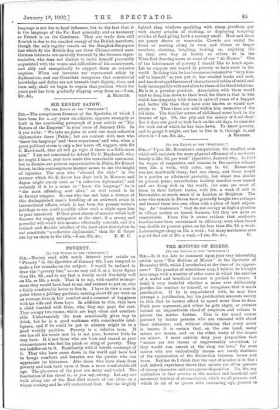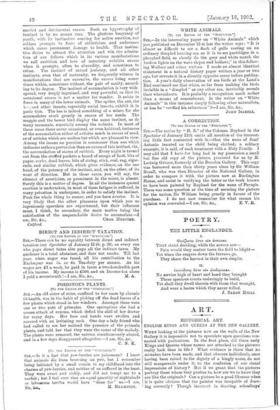THE MOTIVES OF MISERS.
(To THE EDITOR OF THE "SPECTATOR.") • Sr,—Is it too late to comment upon your very interesting article upon " The Motives of Misers" in the Spectator of December 28th, which I overlooked at the time of its appear- ance? The practice of miserliness may, I believe, be brought into range with a number of other cases in which the exercise of a useful and beneficial instinct is pushed to excess. think it very doubtful whether a miser ever deliberately justifies his conduct to himself, or recognises that it needs justification. If he is expostulated with, he may then attempt a justification, but his justification amounts merely to this, that he cannot afford to spend more than he does. Push your argument, and either he gets angry, or retreats behind an impenetrable cloud of suspicion and refuses to pursue the matter further. This is the usual course pursued by insane persons who are reasoned with about their delusions; and, without claiming that every miser is insane, it is certain that, on the one band, many misers are insane, and on the other, many of the insane are misers. I must entirely deny your proposition that "misers are not insane or ungovernably avaricious, or they would run amuck at the 'shop win-lows," for even misers who are undoubtedly ' insane are rarely destitute of the appreciation of the distinction between meum ;tad tztum. Neither do I think that the root of avarice is in fear ; and, indeed, experience shows that misers' are often persons of strong character and courageous disposition. No, Sir, my contention is that avarice is the normal and beneficial and necessary instinct of aectunulation, which we all possess, and which in all of us grows with increasing age, present iss morbid and detrimental excess. Such an hypertrophy of instinct is by no means rare. The glorious buoyancy of youth, with its instinctive craving for active exertion, not seldom prompts to feats of athleticism and endurance which cause permanent damage to health. That instinc- tive desire to attract the attention and win the admira- tion of our fellows which in its various manifestations we call ambition and love of notoriety exhibits excess when it prompts, often to absurdity, and sometimes to crime. The instinct of sexual jealousy, and all other instincts, even that of maternity, we frequently witness in manifestations that are excessive, the excess being some- times within, sometimes without, the pale of sanity, accord- ing to its degree. The instinct of accumulation is A.ery wide spread, very deeply ingrained, and very powerful, so that its occasional excess is not a matter for wonder. It exists in force in many of the lower animals. The spider, the ant, the
”, and other insects, especially social insects, exhibit it in perfe tion. The bee is indeed something of a miser, for she accumulates stock greatly in excess of her needs. The magpie and the bower bird display the same instinct, as do many mammals, especially among the rodents. In most of these cases there occur occasional, or even habitual, instances of the accumulation either of articles much in excess of need, or of articles which are useless but which are pleasant to view. Among the insane no practice is commoner than one which indicates rather a perversion than an excess of this instinct, viz., the accumulation of stores of rubbish. Every night is turned out from the stuffed pockets a hoard of scraps of food, bits of paper, corks, dead leaves, bits of string, stick, coal, rag, cigar- ends, and similar rubbish, which gives evidence, on the one hand, of the potency of the instinct, and, on the other, of its want of direction. But in these cases, you will say, the element of asceticism, so prominent in the miser, is absent. Surely this is a matter of degree. In all the instances quoted exertion is undertaken, in most of them fatigue is suffered, in many privation is undergone, in order to satisfy the instinct. Push the whole thing to excess, and you have avarice. It is very likely that the other pleasures upon which you so ingeniously speculate are experienced, but their influence must, I think, be secondary, the main motive being the satisfaction of the unquenchable desire to accumulate.—I







































 Previous page
Previous page